Students raise concerns about lack of food stipends, administration shares complexities behind school’s budgeting
May 7, 2023
The Archer School for Food: one of Archer’s famous nicknames. With the addition of the servery in 2019, the importance of food has caused the community to refer to Archer as the haven for food. Students are often purchasing a snack in between classes and making long lunch lines when the clock hits 12:05 p.m.
In Archer’s Flexible Tuition program, a food stipend is not included due to complexities within the school’s budgeting. The Oracle sat down with students on Flexible Tuition to learn about their experience with food on campus and with the administration to understand how the program functions.
The Oracle also produced two broadcast-style videos. The first one features student opinions about the importance of food stipends in school, and the second video features the complexities behind budgeting with administration perspectives.
To read this story in another format, click on the link below.
—
The Experience of Students on Flexible Tuition
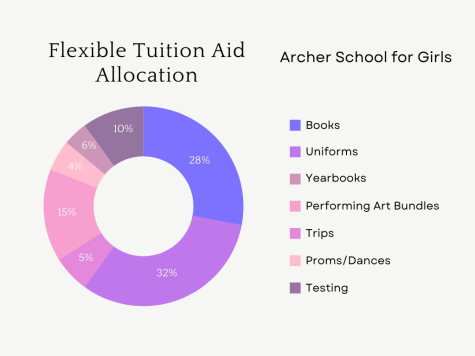
According to Archer’s website, tuition for this school year costs $50,475, and the school awarded more than $4 million to Flexible Tuition. Twenty percent of the student body receives some form of a Flexible Tuition grant. Although the Flexible Tuition program doesn’t cover food, other expenditures are part of the grant recipients receive. Associate Head of School for Finance and Operations Jane Davis said financial aid also allocates funds for textbooks, uniforms, yearbooks, performing art bundles, trips, prom and testing.
Senior Samantha Garibaldi said the addition of a food stipend would help ease a feeling of guilt and would level the playing field within the student body in terms of equity.
“I don’t eat often from Archer’s servery because it’s expensive. I don’t always have money on my OneCard, and I also feel guilty for asking my parents for money for lunch,” Garibaldi said. “I also think it’s interesting how a school like Archer — which emphasizes the importance of equality by imposing practices like the uniforms so students don’t feel less than — but they don’t sometimes consider how access to food can affect their social life and their sense of self.”
For junior Ijeoma Nwafor, she said her parents add $60 dollars to her OneCard every two weeks. She said the pressure of spending her money in accordance with her budget has caused her to be more mindful of how often she visits the servery.
“I think one of the main appeals of this school to me was the servery. I remember when I was touring here, I was blown away by it,” Nwafor said. “Now, I try to treat myself once a week with something. Like on Friday, I’ll usually get fro-yo, or on Mondays, I sometimes get breakfast in the morning.”
The Oracle conducted an anonymous survey to the student body to learn about the experience of students receiving Flexible Tuition and food at school. On the survey, students had the option to share if they receive Flexible Tuition, and if they do, they were prompted to filled out a questionnaire. Out of 279 upper school students, 102 students responded to the survey, and 22 students said they were financial aid recipients.
In a question asking respondents to elaborate if not having a meal stipend has affected their everyday experience, a student mentioned the pricing of the servery. Each entree costs $8.
“I understand that Archer is trying to teach students about budgeting, and how, in reality, almost everything nowadays is expensive … I believe that even if Archer takes off a dollar or two dollars off the food and snacks, it will make fewer students go into the negatives and also will make parents less stressed about remembering when to fill up the OneCards,” a respondent wrote. “Parents already stress enough about paying the bills, and yet, with the high prices, parents have to put in a lot more money than there needs to be.”
The video below features student opinions about the importance of food stipends in school.
The Complexities Behind Budgeting
Head of School Elizabeth English explained that Archer outsources food through CulinArt to provide breakfast, lunch and snacks every school day. Before the switch to CulinArt, the school contracted Fresh Lunches to provide students with a catering service for lunch.
“The entrees we try to keep affordable — there’s inflation, and food is expensive, and labor is expensive,” English said. “I think a lot of our teachers eat here because going across the street is more expensive for them.”
English shared that the way Archer budgets their funds is based on a mission-driven resource allocation model. English said the highest priority is to expand access to the most students possible. Following access are expenses that are directly related to learning, such as domestic and international trips and technology, which is why they are included in Flexible Tuition grants.
“You constantly ask yourself ‘is this serving our mission?'” English said. “It’s always about serving our mission. Every year we put a budget together, and [there are] some things you can’t do that you want to do and other things you do because they are absolutely essential.”
Davis shared Archer’s endowment is restricted only to Flexible Tuition, yet it funds less than 10% of the funds for the program due to the smaller endowment Archer has compared to other independent schools. An endowment is monetary fund that is created for a particular cause to provide long-term support for a specific area. The other 90% of funds are fundraised or donated. English said implementing food stipends would likely result in admitting 1-2 fewer flexible tuition students overall.
“We don’t want students to feel guilty. That’s not anyone’s objective,” English said. “Historically, it’s been a commitment to access. That commitment, as a percentage of overall tuition dollars, has been extremely high at Archer — higher than schools with much bigger budgets and much greater discretion in how they can spend their money because they have more of it.”
With this in mind, English shared the priority of funds traditionally has gone towards activities that are directly connected to the learning of every student. She said not funding trips such as Archer Abroad or Arrow Week are experiences that will have an impact on students’ learning.
“To us, that’s an educational barrier,” English said. “That, to us, feels much more impactful on a student’s education overall because it’s directly relating to teaching and learning. Other schools don’t fund that.”
The video below features the complexities behind budgeting with administration perspectives.
Food Access at Other Los Angeles Schools
Harvard-Westlake School, Brentwood School and the Episcopal School of Los Angeles are nearby independent schools that include food stipends as part of their financial aid support, which also includes trips, technology, athletic clothing, travel and other program grants. However, Harvard-Westlake has a $14 million financial aid budget and Brentwood dedicates $10 million.
According to an analysis from The Chronicle, Harvard-Westlake’s total revenue was $125.7 million in 2022, and shown through Guide Star, Archer’s total revenue in 2019 was $32 million. In 2020, ESLA’s total revenue was $23.9 million.
Within Archer’s operating revenue, 1.3% of that amount is transferred to the endowment, and 16.4% is used for financial aid as shown in the 2021-2022 Impact Report.
This raises the question of whether food stipends should be a higher priority than school trips or if Archer should consider admitting 1-2 fewer flexible tuition students in order to provide stipends to the rest.
From the respondents of the survey at Archer, 63.6% of flexible tuition students said a lack of food stipends has affected their academic experience. Senior Alex Dow, who attends ESLA, said his ability to eat at school without worrying about finances has alleviated stress since his school offers free food for all. At ESLA, 40% of all their tuition revenue is dedicated to fund need-based scholarships for their students.
He also mentioned the importance of schools offering free food due to the fact each student’s food situation at home is different.
“I am poor. Schools should always provide food for students because they don’t know what is going on at home where they are not able to have food,” Dow said. “We are people from low-income areas and, as well as people of color, who live in food deserts … The only time we are able to get actual healthy food is when we go to these richer areas that don’t live in food deserts.”
Similarly to Archer, Dow mentioned he has experienced support from his school for finding funds for trips such as going to Big Bear or funding Ubers to get them to school or back home when needed.
“We recently took a trip to Big Bear, and I did not have anything — no snow boots or anything — the school paid for everything,” Dow said. “If I ask for something, they will most likely try to find the budget for it.”
Sophomore Oghenechovwe Divine Chapele from Mission Vista High School, a public school in Oceanside, is a student worker at her school’s cafeteria. She said that although her district doesn’t pay workers well and she has experienced stressful experiences, she appreciates that she has guaranteed meals she can count on every day. In California, free breakfast and lunch is provided for students from kindergarten to 12th grade in all public and charter schools in the state, regardless of students’ financial situations.
“It’s really encouraging to know that there is guaranteed breakfast guaranteed lunch. I can take what I want without being socially judged and its something everyone has access to,” Chapele said. “Some people rely on having breakfast and lunch at school. If you take into account [that] some people are not eating 24 hours at a time, it really only makes sense if you want to consider their academic and social success.”
Talking about Wealth
Nwafor added that she hopes students become less nervous to talk about finances overall. At her old school, she said students were more comfortable discussing wealth than at Archer. When arriving, she said she had to adjust to a different culture, and receiving a food stipend would be helpful to bridge the transition.
“People at Archer are a little more hush-hush about people’s socioeconomic status,” Nwafor said. “People here are more uncomfortable talking about wealth and the wealth that students or their families have, which I’m not an advocate for all the rich people at this school should out themselves, but I think more people here should be transparent about that and about the fact that you are wealthy. There is nothing wrong with that, but I think downplaying makes you seem strange.”
Garibaldi is the founder and co-president of the Billionaire Girls club on campus, which focuses on teaching students about investments and financial literacy. She said financial literacy is important for students to learn to combat the discomfort that arises when discussing wealth.
“I think it’s very important to talk about finances and especially finances at school and at a school with economic diversity in which not all students have the same access to food and everyday commodities,” Garibaldi said. “It’s very important to talk about and just to understand all the students, what their experience is like and how we can help them in terms of equity versus equality.”
Other than financial literacy and conversations about wealth, Garibaldi said that in addition to the importance of food quality and its connection to academic success, a food stipend can help recipients of Flexible Tuition be less worried in the future.
“Eating a balanced diet plays a big factor in one’s ability to focus and their mental health,” Garibaldi said. “When students don’t have equal access to food, it’s another factor they have to worry about every day.”



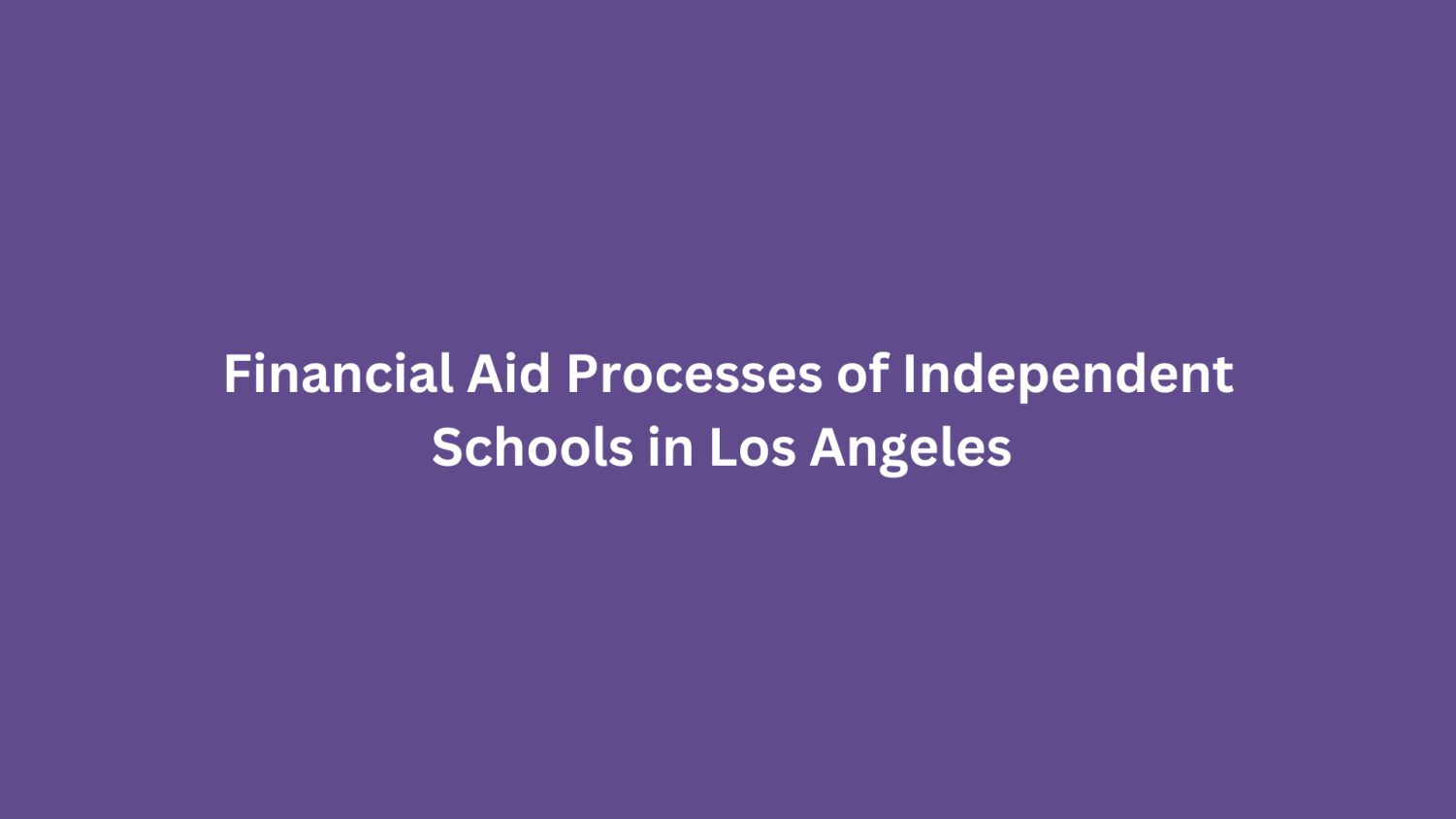

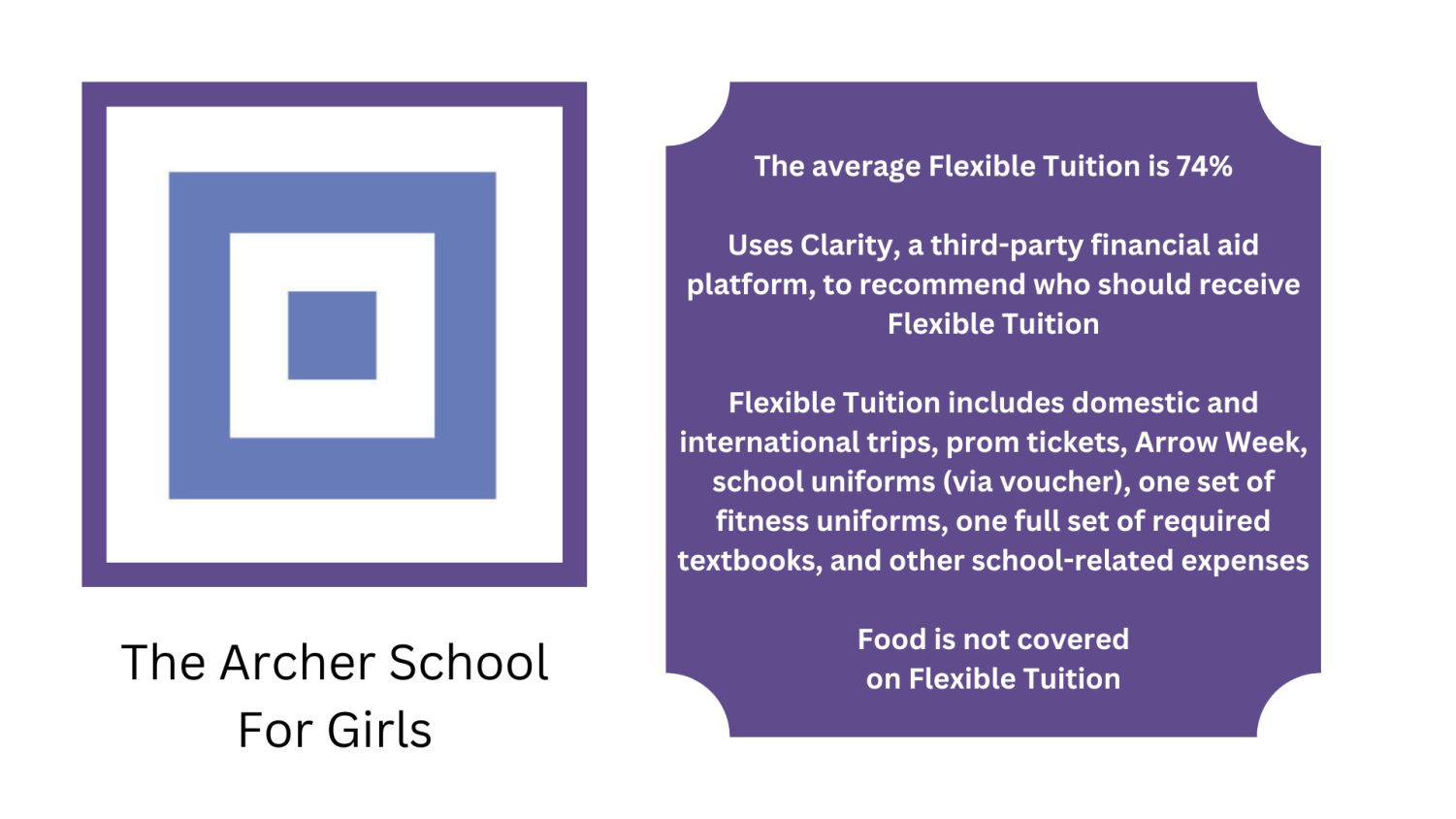






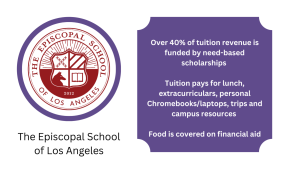


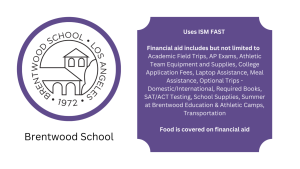



Cathy O'Krent • May 13, 2023 at 8:27 am
What a thoughtful, well researched, and well-written article! As a parent of an Archer grad, as a human being who believes that everyone deserves access to nutritious, life-sustaining food, and as an observer of hunger, food insecurity, and food access inequity in Los Angeles, I thank you for your words.
Allie Yang • May 8, 2023 at 8:57 am
There are NO WORDS to describe the quality of this feature. It does an incredible job of shining light on a complex, multi-faceted issue. The work, care and dedication you both put in is evident. AMAZING JOB MAIA AND LIZETTE :)))